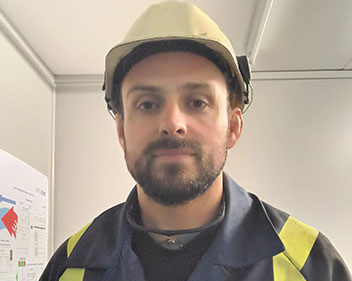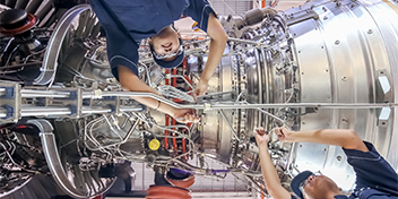
Education and qualifications:
HNC Mechanical Engineering, Gower College Swansea
Job title:
CAT 2 Inspection Engineer
Employer:
Tata Steel UK
Published: 02/01/2024

HNC Mechanical Engineering, Gower College Swansea
CAT 2 Inspection Engineer
Tata Steel UK
I have always had a passion for Engineering and ‘how things work’ from a young age, and having a father involved in the mining industry set me on the path to securing a mechanical engineering apprenticeship based in a coal mine in the Neath Valley. I was, and still am, very keen and enthusiastic to learn about advancing technologies to make the working environment safer and more efficient.
In my current position within Tata Steel UK, I am a Category 2 Inspection Engineer based within the Asset Integrity Department at Central Engineering. My role is to manage an inspection schedule of Pressure Systems Safety Regulations (PSSR) and Control of Major Accident Hazards Regulations (COMAH) assets to ensure that they stay compliant to the relevant legislation and standards. I work closely with engineering and production managers to ensure that the assets remain in a compliant state and operating at maximum efficiency.
A typical working day consists of working through the inspection schedule and performing visual examinations on various items of plant from natural gas pipework, to heat exchangers or even furnace safety relief valves. What I enjoy most about my working day is the variation of plant to inspect, each with their own different applications to steelmaking. Preparation is a key part of my working day and managing upcoming inspections such as organising access or preparing work instruction sheets for an Non-Destructive Testing survey is common throughout a typical working day.
As the role involves working closely within a busy steelmaking plant, a challenging aspect of my role can be to manage and organise a busy inspection schedule to coincide with the production schedule as smoothly as possible. This can involve foresight and arranging my inspections around stop maintenance periods in production, and this aspect can require critical planning and efficiency to ensure inspections can be completed as safely and thorough as possible.
As I mentioned earlier, I have always had a passion for learning ‘how things work’ and I find that my role as an Inspection Engineer in a busy steelmaking plant allows me to be actively involved with the processes and plant required to make steel. I enjoy ensuring that critical items of plant are efficiently maintained and remain in compliance with PSSR and COMAH regulations to keep the steelmaking process going. Another part of my job that I enjoy is meeting and working closely with staff from a variety of backgrounds and experiences.
Becoming an Incorporated Engineer within the Institution of Mechanical Engineers (IMechE) was a great personal achievement of mine. I’ve always understood the effort and dedication that it requires to be professionally registered and having come through the Career Learning Assessment route, I felt registration may have not been achievable for me so when I did become registered as an Incorporated Engineer in December 2022 it was a very proud moment for myself, especially as it underpins key learnings throughout my working career.
After joining the Asset Integrity Inspection team back in April 2022, I was aware that most of my teammates were either already professionally registered or working towards professional registration. This spurred me on to make myself accountable and actively work towards professional registration as I felt that it would demonstrate my ability to operate at a recognised standard and give me self-confidence as an engineer going forward.
Apart from looking great on my CV, professional registration has given me self-confidence and self-belief in my own capabilities as an engineer. To a wider audience and to closer colleagues, registration has identified that I meet recognised set standards as an engineer. It has also benefitted my career as it reflects my commitment to the field of engineering as well as setting myself a clear, structured path to progression.
My employer benefits from my professional registration as they are fully aware that I meet set standards and can work competently and to a high ethical standard. It gives my employer the knowledge that my abilities have been reviewed externally and met a set of specified criteria. Also, my employer is aware that I am available to guide or mentor fellow colleagues who also choose to apply for professional registration.
My advice would be – don’t hesitate in beginning of the process towards professional registration. I found that there was always help on hand at every stage of the process such as webinars, articles from the website and YouTube videos, which all help towards the application. I also found that after reflecting throughout your own working career to date, you will have achieved so many critical skills that are desirable without even realising it, so it’s important to highlight these career milestones in the application.
I am due to become a father for the first time in April and it has had me reflecting my career journey up until this point and now what comes next? I would love to complete a Mechanical Engineering degree to further solidify my academic knowledge and hopefully then go on to become Chartered soon after that. Within my career I would like progress to the next stage and become a UKAS accredited CAT 1 Inspection Engineer.
I have actively enrolled and completed part-time courses held at Swansea University to give myself a deeper understanding of other engineering fields such as corrosion and coating technologies and fluid pressure systems. I have worked closely with The Welding Institute in expanding my knowledge of inspection of in-service pressurised equipment. I have also volunteered myself to mentor engineering graduates during a maintenance stop period where numerous safety relief valves required overhaul and testing.

Being professionally registered demonstrates your commitment, enhancing your knowledge, skills and competence for the engineering needs of today.

Read our case studies from your peers about the benefits of professional registration!

Interested in finding out more? Join a Licensed PEI to start your journey today.